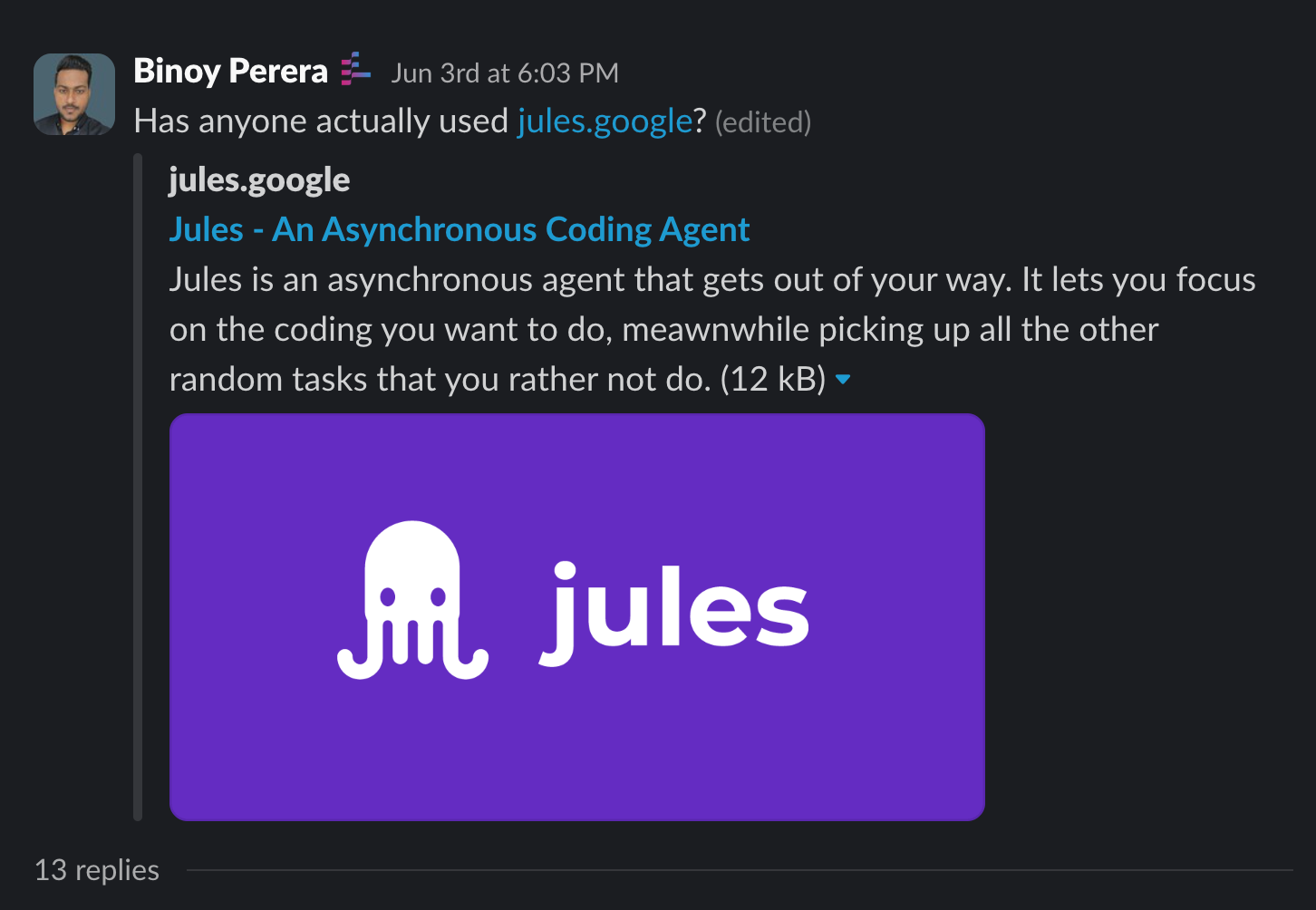🛠️ Jules vs Copilot, RAG Graph DBs, Confidential PDF Extraction, Agent Kanbans, and GPU GitHub Runners
Community Insights #8: Google's Jules, RAG with graph DBs, secure PDF extraction workflows, Kanban for agents, and GitHub GPU runners.
Every other Thursday, we surface the most thought-provoking, practical, and occasionally spicy conversations happening inside the AI communities so you never miss out—even when life gets busy.
In this edition of 🗣️ BuildAIers Talking 🗣️, here are the top five hot-topic conversations from the community so you can keep up without the endless scroll:
Is Google's Jules agent ready to replace your dev workflow?
Neo4j vs. FalkorDB: What's the best graph database for RAG systems?
What's the best local solution for extracting confidential documents?
Could Kanban-style tools (like Asana or Trello) help agents manage complex tasks?
What's the best way to spin up GPU-backed GitHub runners without paying for idle time?
Grab a coffee ☕ and dive in, learn what others are actually shipping, and decide what’s hype vs. helpful. 👇

🤖 Is Google's Coding Agent "Jules" Actually Useful for Developers?
Channel: #agents
Asked by: Binoy Perera
Jules is Google's asynchronous coding agent that promises to handle tedious coding tasks. But really, how practical is it for actual development workflows?
Key Insights
Médéric Hurier: Ran 5–8 tasks: ~25 % of outputs were “too complex or simply bad,” web-only flow felt clunky versus IDE-native Copilot.
Alex Strick van Linschoten: Hit time-outs and random errors; still prefers Claude Code in GitHub Actions (GA). Alex’s experience is Claude Code in GA > OpenAI Codex > Jules.
Meb and Han Lee: Doubt devs will adopt a cloud-only interface; local iteration speed still wins.
Takeaway:
If your coding agent can’t live inside the IDE and ship clean PRs fast, developers won’t adopt—no matter how big the logo on the landing page. For now, GitHub Copilot + Claude Sonnet seem to still win. Jules may evolve, but today it’s more of a demo than a daily driver.
🕸️ Graph Databases for RAG: Neo4j, FalkorDB, or Something Else?
Channel: #llmops
Asked by: Zack
When building retrieval-augmented generation (RAG) systems, vector databases are standard—but what about graph databases?
Key Insights:
Chirag: Highlighted Neo4j’s easy integration with Microsoft's GraphRAG.
Laszlo Sragner: Criticized Neo4j’s resource-heavy JVM reliance, problematic query planning, and high costs in enterprise tiers, suggesting FalkorDB as a high-performance, OSS alternative.
Zack: Considered TigerGraph too but remained hopeful about FalkorDB's potential given Neo4j’s downsides.
Takeaway:
Graph DBs shine when your queries go beyond k-NN similarity. Neo4j is a safe choice but reportedly with issues: JVM overhead, opaque query plans, and high enterprise pricing. FalkorDB (from the RedisGraph crew) claims 10-100× speed-ups plus built-in vector search.
If you hate JVM overhead, FalkorDB (or another C++-based engine) might be the sweet spot.
Rule of thumb: Choose a graph DB only if your queries really can’t be done with joins—otherwise stick to a fast SQL + vectors setup.
📄 How Can You Extract Confidential PDFs Locally for RAG?
Channel: #llmops
Asked by: Valdimar Eggertsson
Most devs have found it tricky to find solutions or workflows to extract data from confidential documents without sending them to external APIs. What's the best open-source, local solution?
Key Insights:
mark54g (Elastic): Run the open-source Unstructured library privately, then pair with Elasticsearch for hybrid lexical + semantic search; enterprise ML features add RAG playgrounds.
Damian Galetto: Suggested open-source Unstructured.io (self-hosted) or Docling for pure local extraction, pairing with Ollama for local embeddings.
Takeaway:
If data can’t leave the building, OSS extractors (Unstructured, Docling) plus locally deployed LLMs are your safest combo to stay 100 % on-prem.
Here’s a stack that could work to keep the entire RAG loop on-prem: OSS Unstructured for parsing, a local embedding model via Ollama, and your choice of ClickHouse, Elastic, or other hybrid DB for search.
📋 Can a Kanban Tools Manage Agent Workflows Better Than Plain Files?
Channel: #mlops-questions-answered
Asked by: Tom Elliot
Can Kanban-like task management tools help AI agents manage state in production—or is simple file-based tracking enough?
Key Insights:
Cody Peterson: Keeps it simple—agents write progress to task.md, then he restarts sessions with that file as context.
Patrick Barker: Demoed AgentTutor, a beta Kanban-style UI that records workflows and trains agents via online RL.
Takeaway:
Complex workflows might benefit from visual Kanban-style state management, but for simpler production environments, flat files (or GitHub Issues) are easier to automate and version.
So if you build customer-facing agents, a structured task DB (or Kanban API) helps orchestration. For internal dev loops, plain text + Git remains king. Evaluate your options based on your complexity and visibility needs.
🔗 Explore agent task management ideas →
🤔 What's the Easiest Way to Set Up GPU-backed GitHub Runners Without Enterprise Costs?
Channel: #mlops-questions-answered
Asked by: George Pearse
Running GPU workloads on GitHub Actions can get pricey. What's the best solution for flexible, cost-effective GPU-backed runners?
Key Insights:
David DeStefano: Self-host via Modal, EKS/Fargate, or GCP Autopilot; each spins pods on demand.
Barry Har: GKE Autopilot works, but cold-starts take minutes and the costs can add up quickly.
Patrick Barker: Autopilot costs can spike; autoscaling node groups or cross-cloud GPU pools (like SkyPilot) may be better for lower-cost scalability.
Takeaway:
For hobby or small-scale GPU CI, serverless GPU providers (Modal, Beam, SkyPilot) minimize idle costs with good pay-per-use economics. For production, an autoscaled k8s/EKS/GKE setup gives more control—just monitor cold-start latency and hidden costs.
🔗 Discover cost-saving strategies →
Which community discussions should we cover next? Drop suggestions below!
We created ⚡ BuildAIers Talking to be the pulse of the AI builder community—a space where we share and amplify honest conversations, lessons, and insights from real builders. Every other Thursday!
📌 Key Goals for Every Post:
✅ Bring the most valuable discussions from AI communities to you.✅ Build a sense of peer learning and collaboration.
✅ Give you and other AI builders a platform to share your voices and insights.
Know someone who would love this? Share it with your AI builder friends!








